Tutorials
SEO tutorial provides basic and advanced ideas of SEO. SEO stands for search engine optimization. It provides techniques to optimize the websites in order that they will rank well on the Search Engines.
SEO Certification and Course
An SEO certification is awarded to people who with success complete an SEO Course. It shows that you simply have the required training and skills to figure out search engine optimization. There are some ways to induce SEO certification. You’ll follow an internet SEO course or attend a classroom-based course.

Our SEO training course includes in-depth knowledge of SEO strategies, tips, and tricks. We will teach you all about good website structure, keyword options, metadata, on-page, and off-page optimization.
What is SEO?
Search engine optimization (SEO) is that the art and science of obtaining pages to rank higher in search engines like Google. As a result of the search is one among the most ways that within which people discover content online, ranking higher in search engines will lead to a rise in traffic to an internet site.
How does it work?
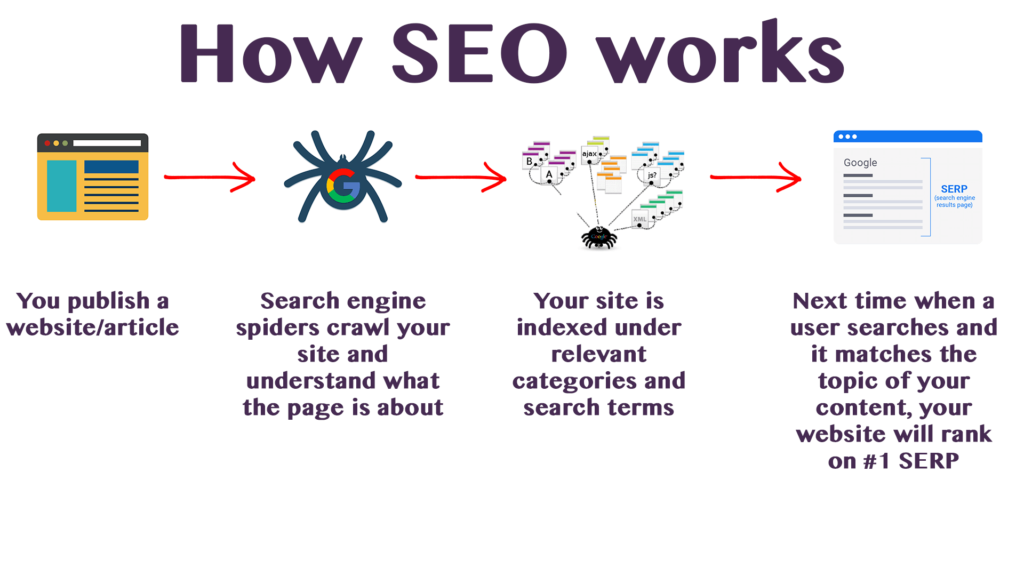
SEO is that the method of taking steps to assist a website or piece of content rank higher on Google. To create it a small amount easier, search engine optimization means that taking a bit of online content and optimizing it therefore search engines like Google show it towards the highest of the page once somebody searches for something.
Importance of SEO:
SEO is that the apply of accelerating the amount and quality of traffic to your website through organic search engine results. A better ranking, once somebody searches a term in your business, will increase your brand’s visibility online. This, in turn, offers you a lot of opportunities to convert qualified prospects into customers.
Why do we need SEO?
SEO will assist you to build higher relationships along with your audience, improve the client expertise, increase your authority, drive more individuals to your website, provide you with an edge over the competition, and increase conversions, which suggests more sales, more loyal customers, and a lot of growth for your business.
8 Reasons Your Website Needs SEO
It can help you build your brand
Although branding is usually thought about as a more ancient promoting strategy, whereas SEO falls firmly into the digital class, the 2 involve similar steps.
Building a brand needs considering each what you offer, and what others say regarding it.
And once you check out the steps concerned in optimizing a website, the factors are similar. You would like to make content that’s in line together with your audience’s desires and interests, then find ways in which to earn links to its content from different sites.

If you retain this relationship in mind as you develop your SEO strategy, you’ll be able to choose keywords and build content that’s in line with the image you would like your brand to possess.
Then, your online presence can replicate your ideal branding — and assist you to establish it together with your target audience.
An optimized website earns more traffic
On the surface, the goal of SEO optimization is to boost your site’s rankings in search results.
But on the far side that, the aim of achieving high rankings is to draw in additional traffic — and ideally, to convert that traffic into customers and leads.
And just in case you were curious, it works.
For example, simply take a glance at the following organic traffic report from a siege Media case study.

Over the course of 1 year, this brand new site’s traffic increased from zero to 100,000 guests — entirely from SEO.
If you wish to bring more users to your website, SEO is that the best thanks to accomplishing this goal.
SEO doesn’t require you to pay for ad space
One of the largest advantages of SEO is that it doesn’t involve paying for ad house.
Consider however traditional ad campaigns operate.
You determine a location you would like your brand to appear, whether or not that’s on a specific TV channel or radio station, or within the pages of a magazine or newspaper. Then, you pay the company that owns that media for placement. you would possibly pay for your ad to run for a precise length of your time, or among a precise range of problems. As shortly as that amount is up, your ad stops showing — and stops generating results for your business.
Now, contemplate the varied pages that seem in search engine results.

The top 2 listings during this screenshot are pay-per-click, or PPC, ads, as denoted by the little “Ad” tag.
Much like traditional ad campaigns, earning one among these spots involving in progress prices.
Of course, if you’re acquainted with PPC, you recognize that advertisers only pay once a user clicks an advertisement and visits their website. This actually offers it an edge over ancient strategies.
Still, each traveler involves a value — and also the minute a publicist pauses their campaign, they stop introduction.
But the sites showing within the organic results, directly below those ads, aren’t paying a cent for those rankings.
While they possibly invested with a major quantity of your time and cash into making the pages that are ranking in those spots, they seem on page one as a result of Google’s algorithmic program thinks they supply worth to users.
As a result, they’re earning traffic while not outlay a cent.
It helps your target audience find your site
SEO will facilitate your business to get ahead of your target audience as they’re actively finding out info.
And considering however common it’s for customers to use search engines to search out info concerning products and services, this can be a large opportunity.
In fact, 62% of customers turn to search engines first once they need to learn a lot about a couple of new businesses, products, or services — and 41% use them once they’re able to purchase.
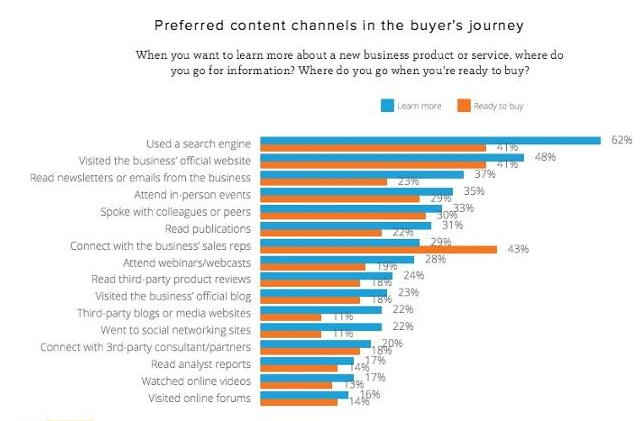
This means that if you want your business to be part of a user’s online research process, it needs to show up in search results for keywords related to the products or services you offer.
Plus, according to that same survey, 48% of consumers prefer to visit a business’s official website to learn more about them.
So having a strong online presence will not only help you reach your marketing goals but will also enable your target audience to research and buy in a way that works for them.
It boosts your credibility and authority
The Internet has drastically changed what the sales process looks like for many businesses.
That’s as a result of these days, customers have access to a wealth of useful resources that may help them study their choices before they speak with a sales representative.
And with SEO optimization, you can become part of that learning process.
That’s especially true if you mix your SEO efforts with content marketing. once you produce informative, valuable content, you’ve got the chance to create trust and believability with potential customers early within the analysis section.
Here’s a general overview of how this works:
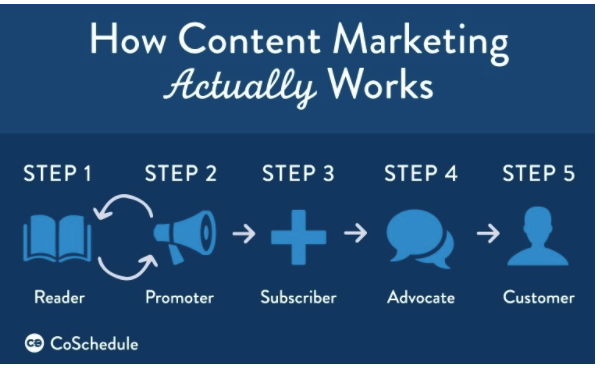
This is where the process slows down a bit.
That user might return to your site several times and read your email content regularly over the next few months without taking action.
And if you’re used to the traditional sales process, this can be frustrating.
But with each piece of content they read, you’re establishing your brand as a credible, authoritative source of information.
Then, once they’re finally able to build a sale or speak with a sales representative, they’ll understand specifically that company to turn to — and be extraordinarily comfortable doing this after all of the useful info you’ve already provided for free.
It can help you stay ahead of your competitors
As you optimize your site, you’re not just working to improve where your site ranks on results pages.
You’re also moving above your competitors.
Just consider that the first result on any given results page gets an average of 20.5% of the clicks. From there, the second result gets 13.32%, and the third gets 13.14%.
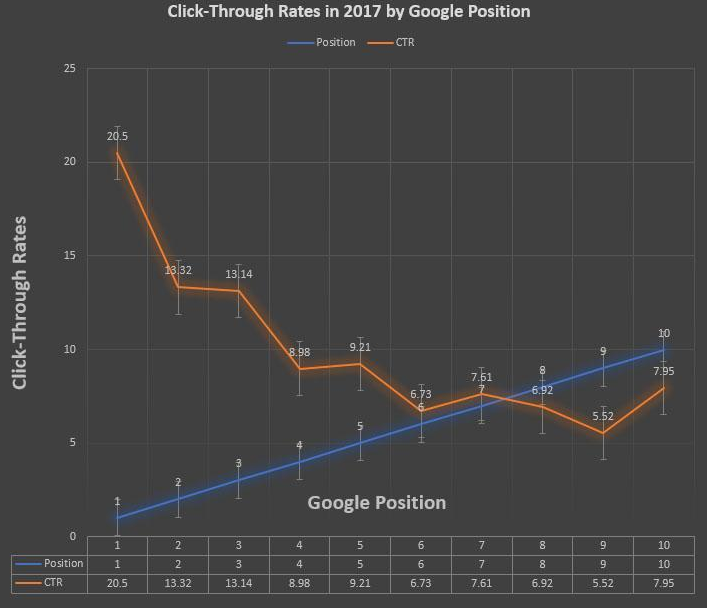
This means that as you move up in search results, you’ll earn a larger percentage of the clicks for your target keywords — and your competitors will earn less.
It improves user experience
Google’s ultimate goal is to provide the best possible results for its users.
As a result, many of their algorithm updates focus on making sure that they’re directing users to sites that not only provide relevant content, but also a great user experience.
That’s why today, technical factors like mobile friendliness, usability, and site speed play a much bigger role in rankings than ever before.
While this means that optimizing your site might require a bit more professional help, it also means that you’ll be continuously improving the user experience your site provides.
And when you consider the impact that user experience has on conversions, this can have a significant impact on your sales and revenue in the long run.
It’s easy to measure
Finally, one of the biggest advantages of SEO is that you can measure virtually every aspect of your results.
Unlike traditional methods, which often rely on looking for correlations between ad campaigns and sales, it’s easy to see the return you’re getting from your SEO investment.
You can use tools like Google Analytics to monitor your traffic, referral sources, conversions, and any other metric that matters to your business.
This way, you can accurately evaluate what’s working — and what isn’t — and be confident that you’re allocating your marketing budget to the strategies that have the biggest impact on your most important goals.
Types of SEO: Three types of SEO
On-page SEO
The work is done in your blog. This means to design your website properly which is SEO friendly. Follow the SEO of rule to use the template for your website. Writing good content and the ones that do use good keywords that are most searchable in search engines.
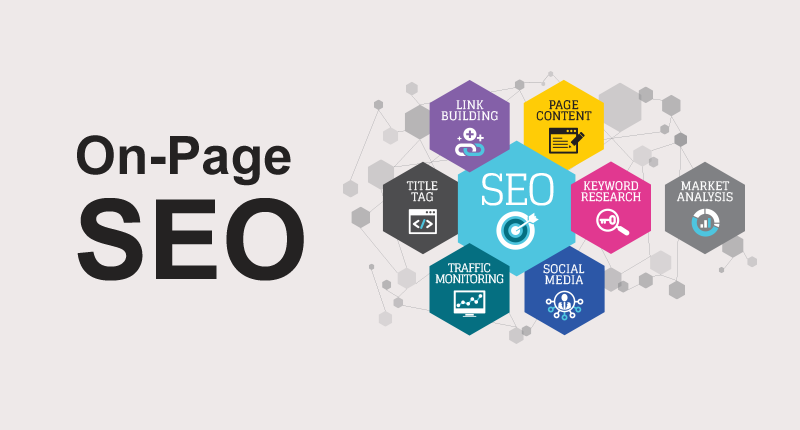
On-page SEO is the preparation of optimizing individual web pages to rank higher and earn more applicable traffic in search engines. On-page discusses both the comfortable and HTML source code of a page that can be optimized, as different to off-page SEO which mentions links and further external signals.
Off-page SEO
Altogether the work of off-page SEO is finished outside the blog. In Off-page SEO, we have to endorse our blog, like going to various popular blogs, observing their object, and give in to the link of our website, we call it backlink. The website benefits a lot from backlinks.
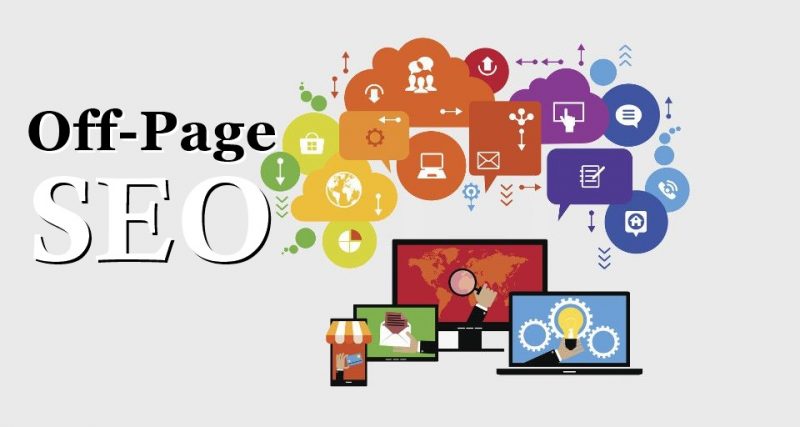
Make an attractive page of your website on social networking sites like Facebook, Twitter, and Quora to increase your followers, this has the chance of increasing more visitors to your website. In big blogs which are very popular, give in to visitor posts on their blog, this will agree visitors to their blog to identify you and traffic will start upcoming to your website.
Local-page SEO
If you have a local business, such as a shop, where people repeatedly visit you, then if you optimize your website in such a system that people be able to without problems reach you in real life too. If now you only objective your personal local area and SEO optimized your site for that reason. Then this type of SEO is called local SEO. If you do local SEO, then this is the summation of two words Local + SEO. That is, SEO is done protection in mind a limited audience is called Local SEO.
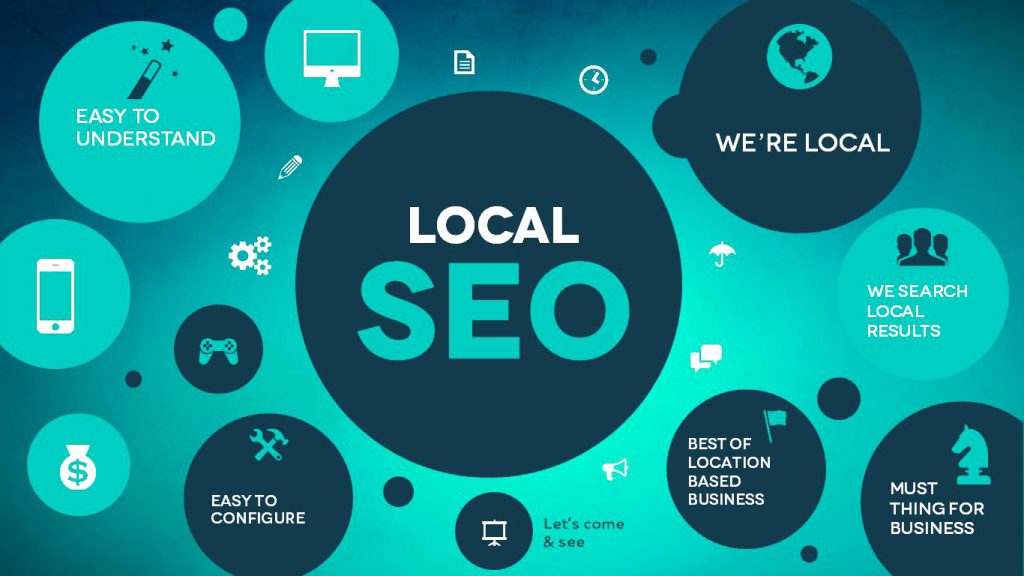
This is a technique in which your website or blog is specially optimized so that it ranks improved on the search engine for a local audience. By the way, with the help of a website, you can objective the complete internet, whereas if you want to target only one certain locality, then for this you have to use Local Seo. In this, you will have to optimize the title of your city, while its address information will also have to be optimized together. Although to say it for a moment, then you have to optimize your site in such a way that people can know you not only online but also offline.
Advantages of SEO:
- SEO Increases Organic Discovery & High-Quality Website Traffic.
- SEO Offers Impressive ROI
- SEO Improves Credibility & Trust
- SEO Provides 24/7 Promotion
- SEO Targets the Entire Marketing Funnel
- SEO Reaches Your Entire Target Audience
- SEO Optimizes User Experience
- SEO Enhances PPC Success
- SEO is a Long-Term Marketing Strategy
- SEO is Key to Search Visibility
Scope of SEO: SEO is that the force behind a co company’s online success. Internet marketing is currently a billion-dollar trade and everybody is slowly but sure acceptive this. Even high companies in India and also the world are currently keeping vast budgets for web marketing. There is such a lot of buzz going regarding web marketing. People know that SEO will bring them new prospects for their products and services. However, what’s the scope of SEO’s in India as compared to the remainder of the globe.
Role of SEO: SEO optimizes the keywords possibly to be searched for a business so the website is found. As an SEO Manager, you’ll manage the analysis of SEO to assist the digital marketing team run effective campaigns, further optimizing the company’s website, social media pages, and another content efforts.
Responsibilities: The responsibilities of an ‘SEO’ aren’t restricted to keyword analysis, link building, and website accessibility, however, is way over what we are able to consider because of the classic SEO. This may include.
- Technical SEO
- Social media
- Voice search
- Local search
- Mobile search
- Online Reputation Management
- Secured sites (HTTPS)
- Content Strategy and promoting
- Knowledge graph, answer box, and entity search
- User expertise testing
5 Benefits of SEO:
- Establish brand awareness
When you focus on SEO efforts, you get more visitor traffic to your website. This increases your brand awareness, to encourage more people to purchase your products/services.
2. Improves website user experience
Google has announced that the user experience of your website, will help you rank higher by search engines. They want their users to discover high-quality content, so they give priority to sites that create content and web pages with this goal in mind.
3. Increase sales through inbound leads
People are already searching for that product/service on search engines when they find you. They are the ones who discover you which means you have less work to do to close the sale. Unlike outbound sales, which requires calling, emailing, etc.
4. Makes your website mobile-friendly
Google shared that you should focus on the user experience of those that visit your website through their mobile device. If the experience on a mobile device is poor for visitors, they will be less likely to stay on your website to explore more content.
5. Increases website speed time
The page load speed of your website helps users see your content faster. If the page loads slowly then a user is more likely to bounce from that page without seeing the content. SEO makes you prioritize page load speed, to ensure it’s faster.
Qualification and Skills Required for SEO Professionals
Graduation or diploma after 10+2 is the minimum qualification required for becoming an SEO Professional. However, to work in the SEO domain, you don’t need a degree only but also require a diverse skill set that cannot be defined by the traditional examinations. Here are just a few skills that are the prerequisite:
- Good knowledge of HTML and CSS
- Sound knowledge of how search engines such as Google work
- Good analytical and logical skills
- Well-written communication skills (such as writing emails, blog comments, website blogs, etc.)
- Basic knowledge of photo and video editing
- Basic knowledge of creating presentations and reports
- Sound knowledge of social media such as Facebook, Twitter, and LinkedIn
- Basic understanding of user experience and customer behavior in an online world
Conclusion
SEO tools are a very important consideration to assist optimize an internet site for search engines. Several tools disagree within the scope of their function yet additionally analyze totally different SEO factors. A number of the foremost important areas to be analyzed are keywords, content, backlinks, domain, and social media.
If you wanna become a SEO engineer in the future, So I would suggest you go through DevOpsSchool which is the best platform for learning. They can provide you Online and Classroom training Programs by an expert. To get in-depth knowledge of SEO along with its various tools, check out our interactive, live-online training here.
Thank you!

I’m a DevOps/SRE/DevSecOps/Cloud Expert passionate about sharing knowledge and experiences. I am working at Cotocus. I blog tech insights at DevOps School, travel stories at Holiday Landmark, stock market tips at Stocks Mantra, health and fitness guidance at My Medic Plus, product reviews at I reviewed , and SEO strategies at Wizbrand.
Please find my social handles as below;
Rajesh Kumar Personal Website
Rajesh Kumar at YOUTUBE
Rajesh Kumar at INSTAGRAM
Rajesh Kumar at X
Rajesh Kumar at FACEBOOK
Rajesh Kumar at LINKEDIN
Rajesh Kumar at PINTEREST
Rajesh Kumar at QUORA
Rajesh Kumar at WIZBRAND
